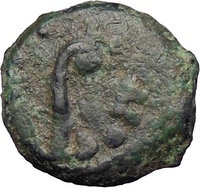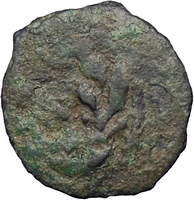Pontius Pilate Roman Procurator of Judaea
Crucifixion of Jesus Christ
History Ancient Coins
Buy authentic ancient Pontius Pilate coins. Read the history of the
Roman Procurator of Judaea and explore a large selection of ancient
coins from a trusted online ancient coin dealer. Every coin comes with
it's own custom-made, unique certificate of authenticity $50-$100 value,
absolutely free, a lifetime guarantee of authenticity, professional
research photograph and history. The best value at an online coin shop
you will find!
 
Example of Authentic Ancient
Coin of:
Pontius Pilate - (chiefly known for crucifixion of
Jesus) ruled 26-36 A.D.
Procurator of Judaea under Emperor Tiberius, Roman Emperor: 14-37
A.D.
Bronze Prutah Struck at the mint of Jerusalem 30 A.D.
Reference: Hendin 649
Lituus, surrounded by TIBEPIOY KAICAPOC.
Date LIZ (= year 17 = 30 C.E.) within wreath.
* Numismatic Note: Authentic ancient biblical coin,
issued by the Roman procurator whom had Jesus Christ crucified. Very
rare, unique piece of ancient history.
You are bidding on
the exact item pictured, provided with a Certificate of Authenticity and
Lifetime Guarantee of Authenticity.

Pontius Pilate;
Latin: Pilatus, was the
Prefect of the
Roman Empire's
Judaea Province from the year AD 26
until AD 36. Typically referenced as the fifth
Procurator of Judea, he is best known
as the judge at
Jesus'
trial and the man who ordered his
crucifixion, as attested by the
non-Christian
Cornelius Tacitus (who doesn't mention
the method of execution itself), the Jewish historian
Flavius Josephus and by the Bible.
Pilate appears in all four
canonical
Christian
Gospels. Mark, depicting Jesus as
innocent of plotting against Rome, portrays Pilate as extremely
reluctant to execute Jesus, blaming the Jewish hierarchy for his death.
In Matthew, Pilate washes his hands of Jesus and reluctantly sends him
to his death. In Luke, Pilate not only agrees that Jesus did not
conspire against Rome, but
Herod Antipas, the tetrarch, also finds
nothing treasonous in Jesus' actions. In John, Jesus' claim to be the
Son of Man or the Messiah to Pilate or
to the
Sanhedrin is not portrayed.
Pilate's biographical details before and after his
appointment to Judaea are unknown, but have been supplied by tradition,
which include the detail that
his wife's name was
Claudia Procula (she is canonized as a
saint in the
Greek Orthodox Church) and competing
legends of his birthplace.
|